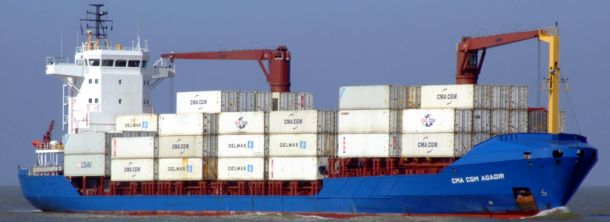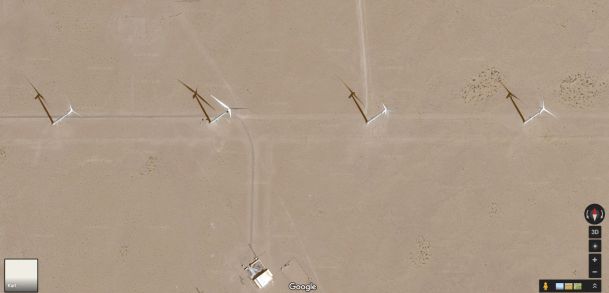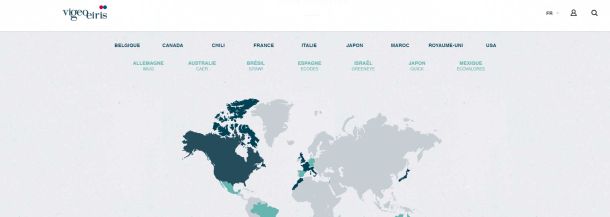
French HDF Energy announces its partnership in gigantic green hydrogen production project in occupied Western Sahara.
Photo: “Allah, the Country, the King”. Moroccan propaganda on a cliff near Dakhla, occupied Western Sahara. By @ElliLorz.
On 15 November 2023, French green hydrogen developer Hydrogène de France (HDF Energy) announced [or download] it has teamed up with the Moroccan company Falcon Capital Dakhla to install an 8 GW green hydrogen production project “in the Dakhla region of Morocco”.
Dakhla is however not located in Morocco, but in the part of Western Sahara that Morocco has illegally and militarily occupied since 1975.
The project, dubbed “White Dunes”, is scheduled to kick off construction in 2025, with hydrogen production expected for 2028. The 8 GW production project will be underpinned by 10 GW of wind and 7 GW of solar power.
Earlier this month, Western Sahara Resource Watch (WSRW) reported that the Moroccan government had announced a string of renewable projects in occupied Western Sahara in its 2024 Finance Bill, including what was described as the Falcon project to which the government had allocated 150,000 hectares of “public land”.
HDF Energy's press release confirms the acreage, and adds that feasibility studies, a preliminary project design, a phased planning and preliminary environmental and social impact study have already been carried out during the past two years.
WSRW has not heard of any Saharawi being approached in the alleged social impact. Most likely, WSRW expects that the study is only undertaken in partnership with interests of the neighbouring country of Morocco. WSRW wrote a letter to HDF Energy on 23 November, inquiring how the firm relates to the Saharawi people's right to self-determination.
As far as WSRW can tell, this is the first of many of Morocco's rumoured and planned green hydrogen projects in occupied Western Sahara to become more concrete. It opens yet another front in Morocco's strategy to capitalize financially and politically on occupied Western Sahara's renewable energy potential, which is larger than that of Morocco proper. A study carried out by Moroccan universities that was published earlier this year, illustrated that the country's greatest potential for green hydrogen production was in El Aaiún and Dakhla - both in occupied Western Sahara.
Morocco is often lauded as a trail-blazer in the switch to more renewable energy sources. What is often overlooked, is that a significant portion of Morocco's wind and solar projects are not being developed in Morocco at all - but in occupied Western Sahara. WSRW's report Greenwashing Occupation (2021) estimated that the energy produced from wind in the territory could constitute 47.20% of Morocco’s total wind capacity by the year 2030, while its share of generated solar power may by then reach 32.64% of Morocco’s total solar capacity.
“Morocco is making itself increasingly dependent on its illegal occupation of Western Sahara to secure its own energy needs. In addition, it has been vocal about plans to sell off any surplus generated in the territory to surrounding countries, including the European Union. This presents a further and major challenge to the UN peace process”, says Sara Eyckmans of WSRW.
Since you're here....
WSRW’s work is being read and used more than ever. We work totally independently and to a large extent voluntarily. Our work takes time, dedication and diligence. But we do it because we believe it matters – and we hope you do too. We look for more monthly donors to support our work. If you'd like to contribute to our work – 3€, 5€, 8€ monthly… what you can spare – the future of WSRW would be much more secure. You can set up a monthly donation to WSRW quickly here.
Controversial container route has opened
And another vessel is on its way.
WSRW asks French ENGIE about business ethics
The French multinational ENGIE operates in occupied Western Sahara. WSRW today wrote the company, asking how they consider the legal-ethical aspects of such operations.
Vigeo Eiris: two years without answer on support to occupation
The UK-French company Vigeo Eiris certified and defended a Moroccan-Saudi energy project in occupied Western Sahara. WSRW calls on the board to engage on the matter.
Polisario goes after leading French banks
The representation of the people of Western Sahara has lodged complaint against the banks BNP Paribas, Société Générale, Crédit Agricole, the insurance company Axa Assurance, airline Transavia and tourist agency UCPA over the accusation of colonisation.



